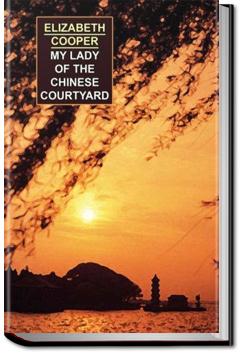UNLIMITED Audiobooks and eBooks
Over 40,000 books & works on all major devices
Get ALL YOU CAN for FREE for 30 days!
My Lady of the Chinese Courtyard
Elizabeth Cooper
Book Overview:
I hope that this book, based on letters shown me many years after they were written, will give a faint idea of the life of a Chinese lady. The story is told in two series of letters conceived to be written by Kwei-li, the wife of a very high Chinese official, [the first series were written] to her husband when he accompanied his master, Prince Chung, on his trip around the world." The second series of letters were written 25 years later to Kwei-li's mother-in-law as China faces revolution and political intrigue. "They are, therefore, the letters of the present-day Chinese woman of the old school, a woman who had by education and environment exceptional opportunities to learn of the modern world, but who, like every Eastern woman, clings with almost desperate tenacity to the traditions and customs of her race.
I hope that this book, based on letters shown me many years after they were written, will give a faint idea of the life of a Chinese lady. The story is told in two series of letters conceived to be written by Kwei-li, the wife of a very high Chinese official, [the first series were written] to her husband when he accompanied his master, Prince Chung, on his trip around the world." The second series of letters were written 25 years later to Kwei-li's mother-in-law as China faces revolution and political intrigue. "They are, therefore, the letters of the present-day Chinese woman of the old school, a woman who had by education and environment exceptional opportunities to learn of the modern world, but who, like every Eastern woman, clings with almost desperate tenacity to the traditions and customs of her race.
How does All You Can Books work?
All You Can Books gives you UNLIMITED access to over 40,000 Audiobooks, eBooks, and Foreign Language courses. Download as many audiobooks, ebooks, language audio courses, and language e-workbooks as you want during the FREE trial and it's all yours to keep even if you cancel during the FREE trial. The service works on any major device including computers, smartphones, music players, e-readers, and tablets. You can try the service for FREE for 30 days then it's just $19.99 per month after that. So for the price everyone else charges for just 1 book, we offer you UNLIMITED audio books, e-books and language courses to download and enjoy as you please. No restrictions.
not with my mind.
The nights are long and cold. The moon casts silver shimmering lights
over the valley below. We cannot stand long on the terrace but must
stay close within our rooms near to the charcoal braziers. The wind
sweeps o'er the rooftree with the wailing voice of a woman.
Oh, Soul of Mine, with weary heart the creeping days I'm counting.
Thy Wife.
14
My Dear One,
We have had a serious sickness come to all the countryside; rich and
poor, peasant and merchant have suffered from a fever that will not
abate. It raged for more than a moon before it was known the cause
thereof. Dost thou remember the Kwan-lin Pagoda? Its ruin has long
been a standing shame to the people of the province, and finally the
Gods have resented their neglect and sent them this great illness.
Over all the city the yellow edicts of the priests have been placed so
as. . . Read More
Try now for FREE!

"Love your service - thanks so much for what you do!"
- Customer Cathryn Mazer
"I did not realize that you would have so many audio books I would enjoy"
- Customer Sharon Morrison
"For all my fellow Audio Book & E-Book regulars:
This is about as close to nirvana as I have found!"
- Twitter post from @bobbyekat


